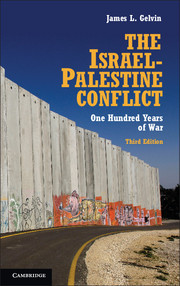Book contents
- Frontmatter
- Contents
- List of Illustrations and Maps
- Author's Note
- 1 The Land and Its Lure
- 2 Cultures of Nationalism
- 3 Zionism and the Colonization of Palestine
- 4 World War I and the Palestine Mandate
- 5 From Nationalism in Palestine to Palestinian Nationalism
- 6 From the Great Revolt through the 1948 War
- 7 Zionism and Palestinian Nationalism: A Closer Look
- 8 The Arab-Israeli Conflict
- 9 The Palestinian National Movement Comes of Age
- 10 Coming Full Circle: Oslo and Its Aftermath
- Glossary
- Time Line of Events
- Biographical Sketches
- Index
- References
9 - The Palestinian National Movement Comes of Age
- Frontmatter
- Contents
- List of Illustrations and Maps
- Author's Note
- 1 The Land and Its Lure
- 2 Cultures of Nationalism
- 3 Zionism and the Colonization of Palestine
- 4 World War I and the Palestine Mandate
- 5 From Nationalism in Palestine to Palestinian Nationalism
- 6 From the Great Revolt through the 1948 War
- 7 Zionism and Palestinian Nationalism: A Closer Look
- 8 The Arab-Israeli Conflict
- 9 The Palestinian National Movement Comes of Age
- 10 Coming Full Circle: Oslo and Its Aftermath
- Glossary
- Time Line of Events
- Biographical Sketches
- Index
- References
Summary
In the late summer of 2001, Mary Robinson, the United Nations high commissioner for human rights, convened the World Conference against Racism, Racial Discrimination, Xenophobia and Related Intolerance in Durban, South Africa. Attendees included the member states of the United Nations General Assembly and assorted observer missions and nongovernmental organizations. At the end of the conference, participants agreed on a final report that included a list of 122 “General Issues” and a 219-point “Programme of Action.” Not surprisingly, the report condemned racism, racial discrimination, xenophobia, and related intolerance. The report also urged the world community to be more sensitive to these evils and undertake efforts to eradicate them. All this was set down in a style of rhetoric once caricatured by former American vice president Nelson Rockefeller as BOMFOG – Brotherhood of Man (under the) Fatherhood of God. It's a small world after all.
The blandness of the final report masks one of several controversies that had threatened to tear apart the conference before it had even convened: An early draft of the report had condemned the “practises of racial discrimination against the Palestinians as well as other inhabitants of the Arab occupied territories,” going so far as to single out Zionism as a particularly virulent form of racism. “The World Conference recognises with deep concern the increase of racist practises of Zionism and anti-Semitism in various parts of the world,” the draft read, “as well as the emergence of racial and violent movements based on racism and discriminatory ideas, in particular the Zionist movement, which is based on racial superiority.” In the end, the final report deleted the offending passages, but not before the American and Israeli delegations staged a walkout.
- Type
- Chapter
- Information
- The Israel-Palestine ConflictOne Hundred Years of War, pp. 198 - 230Publisher: Cambridge University PressPrint publication year: 2014



